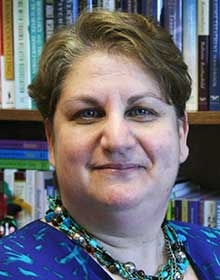Getting to Know: Dr. Freda Ginsberg

As the new Director of the Counseling Psychology graduate program, Dr. Freda Ginsberg is excited to share ideas and best practices with her students, using her personal experiences as reference.
With a plethora of skills, Dr. Ginsberg specializes in not-for-profit-social service management, social justice counseling, service delivery to

women and minority populations, counseling, trauma and crisis intervention, and more. Dr. Ginsberg sat down with Holy Family University to discuss her background, areas of expertise, and many artistic hobbies.
Can you tell me about your background and what brought you to Holy Family University?
I am a Counseling Psychologist, trained at Michigan State University, and also hold a master’s degree in Human Services Psychology from LaSalle University, an MBA from the University of Ottawa, in Ontario, Canada, and a bachelor’s from Drew University in Comparative Religion. For the past four years, I have been a professor at SUNY Plattsburgh in the Counselor Education Department and also served as the Director of the SUNY Plattsburgh Ward Hall Counseling Clinic. Previously, I worked for six years as a non-profit executive director for the Jewish community in Montreal, Quebec, Canada, as well as in my private psychotherapy practice in Montreal.
I was drawn to Holy Family University because it is a small campus dedicated to student development, social justice, and faculty collaboration. As the Director of Counseling Psychology, I believe I can bring my experience and skill in leadership and not-for-profit management, as well as excellence in teaching, research, and professional service. I am wholeheartedly excited to take on this professional challenge, where I can work with my colleagues to identify a broad vision that is inspiring, motivating, and leads to the growth and innovation of the program.
What are your areas of expertise?
My areas of expertise are focused on not-for-profit-social service management, social justice counseling, service delivery to women and minority populations, counseling Jews, trauma and crisis intervention, eating disorders, social justice, multicultural and feminist pedagogy, and mentoring students.
Can you describe some of your current research initiatives?
My scholarship utilizes social justice, multicultural, and feminist frameworks to explore three topics: Jewish identity and counseling Jewish women, feminist and social justice pedagogy, and counseling underserved populations. My data-based research focuses on cross-cultural variables, whereby I utilize qualitative methodologies to explore complex issues and highlight my participants’ voices. Recently, I co-edited a book, and wrote a chapter on social justice for McGill Queens Press, Canadian Counselling and Counselling Psychology in the 21st Century, which features chapters by the leading counseling and counseling psychologists in Canada. Currently, I am co-editing a multi-disciplinary book on trauma and the Holocaust and am also authoring an exhaustive literature review on Jews and the field of psychology.
What is your classroom philosophy when teaching? How do you get the students engaged in the classroom to fully comprehend the material?
Congruent with the values of counseling, all of my courses, trainings, and psycho-educational workshops are contextualized by the scientist-practitioner model, as well as social justice, multicultural, feminist, lifespan, and humanistic theories. Given my multi-disciplinary background and education, I am fluent in various epistemological approaches, and I am able to teach students from a variety of theoretical perspectives. Practically speaking, I am particularly adept at working with a diversity of learning styles and attending to the needs of a broad range of cultural styles. In my classroom, I strive to strike a balance between employing a student-centered approach with sharing my expertise using traditional formats.
Consistent with my teaching, I have developed an expertise in feminist, multicultural, and social justice pedagogies, which require that all student realities are respected and attended to in the classroom. Specifically, these pedagogies inform instructors on how to create classrooms wherein a diversity of perspectives are valued, and the subject matter covered reflects a multicultural reality. These pedagogies also require teachers to consider alternative views regarding authority in the classroom and to design educational experiences that are both communally and individually focused. In addition, these educational philosophies ask teachers to acknowledge the value of formal knowledge acquisition as well as personal and character development.
What are some of your hobbies outside of the classroom?
I fancy myself to be an artist, and over the years, I have created many pieces using the formats of collage, needlework, jewelry construction, and fabric craft. I am also a voracious traveler and have been to many countries around the world and eagerly await the opportunity to continue to explore the globe. I am also passionate about my Jewish life, and I am fluent and literate in Modern and Biblical Hebrew.
